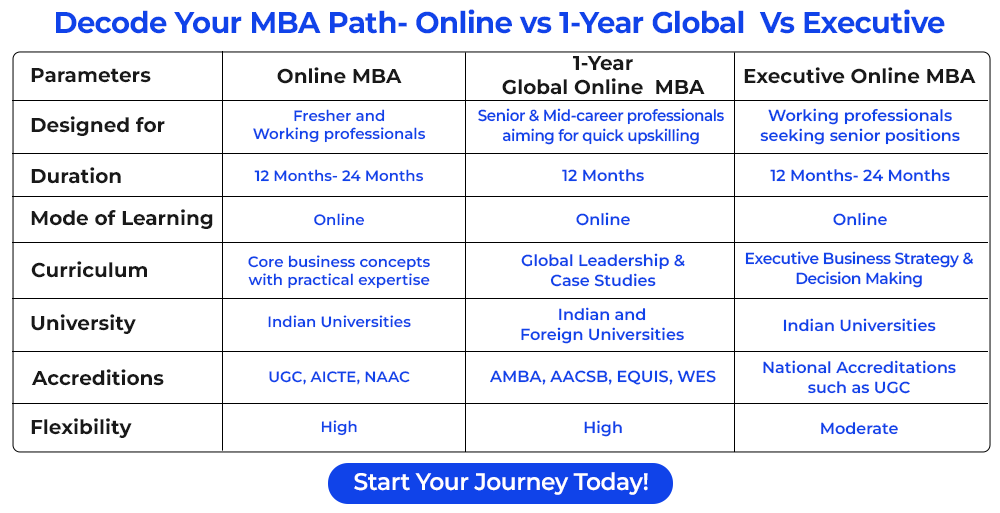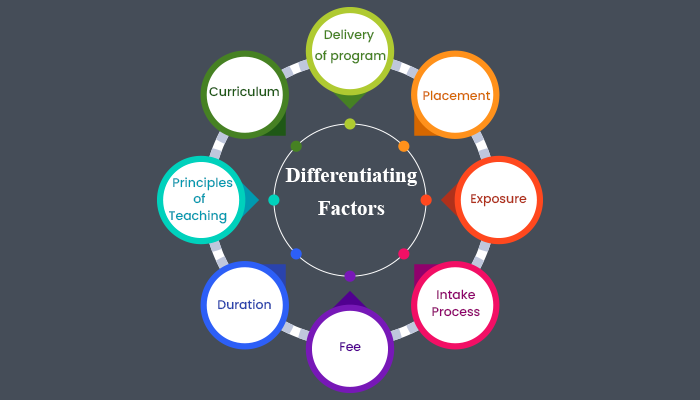Selecting the right MBA these days isn’t just about getting a degree — it’s about what fits your life and goals. Whether you’re thinking of a regular full-time MBA, an Online MBA that lets you work while studying, or a distance MBA that’s easy on the pocket, knowing how they really differ is super important. In this blog, I’ll break down the main points about Regular, Online, and Distance MBAs so you can figure out which one actually works best for you. Let’s dive in!
What is an MBA Degree?
Master of Business Administration is a professional postgraduate course. The program is designed to prepare skilled management professionals capable of handling business operations. This program is offered by the top universities and business schools in India. MBA programs are offered in Regular, Online, and Distance modes of learning. Irrespective of the mode of learning, every MBA degree is equally valid if it is obtained from a recognized higher education institution.
The duration of the MBA program is 2 years with 4 semesters. It is the same for all modes of the MBA program. The maximum duration to complete this program is generally 4 years. This professional management program extensively covers management principles, with expertise in developing leadership and management skills.

Which MBA is Better: Regular, Online, or Distance?
Choosing the best MBA can be subjective. An MBA, which seems suitable for one person, may not be appropriate for another person. Here is how you can choose a better MBA program that suits you the best.
When to Choose a Regular MBA?
If you’re a fresh graduate or can afford to take a full-time break from work or personal commitments, a regular MBA is ideal. It offers hands-on learning, internships, and strong placement support. Plus, the campus experience and peer interaction are unmatched for building networks.
When to Go for an Online MBA?
If you’re a working professional or someone who wants flexibility, an online MBA offers the best of both worlds. You can study from anywhere, attend live or recorded classes, and still gain exposure through virtual industry sessions. It’s cost-effective and time-friendly.
When is a Distance MBA Right for You?
If affordability is your priority and you have strong self-discipline, a distance MBA can work. It allows you to continue your job while studying, but you should be prepared to take charge of your own placements and career growth.
Online MBA VS Distance MBA VS Regular MBA
An MBA is a postgraduate degree designed to boost your management skills and career prospects. Whether you choose a regular, online, or distance MBA, the degree holds equal value legally, as approved by the University Grants Commission (UGC). However, the learning experience, cost, flexibility, and outcomes can vary a lot between these options.

Online MBA, Regular MBA, and Distance MBA can be compared on different factors. You can find the difference between the courses by comparing the main details of the regular, online, and distance MBA here:
|
Characteristic |
Online MBA |
Distance MBA |
Full-Time MBA |
|
Delivery of the Program |
Classes, assignments, projects, and even exams are completely online. |
The study material is sent through the post to the students, but the exams are conducted offline. |
Regular offline classroom study with a fixed schedule and timetable of classes, with offline exams, is the mode of program delivery in a full-time MBA program. |
|
Curriculum |
The curriculum is the same as a regular MBA with theoretical as well as practical training. The only difference is that everything happens virtually. |
The curriculum of the Distance MBA is quite concise. |
The curriculum includes both theory and Practical training in the regular MBA program. |
|
Principles of Teaching |
Extremely flexible teaching-learning environment. Flexibility in terms of attending classes, scheduling and giving exams, and submitting assignments. Also, everything happens online through the online learning management system (LMS). |
Fixed schedule for offline exams, but flexibility in terms of selecting exam venue, and online submission of assignments. |
Fixed and strict schedule for assignment submission, exam dates, and class participation. |
|
Duration |
The course duration is 2 years according to the universities. However, you can study at your own pace and take a little more time than 2 years, as specified by the university authorities. |
The course duration is a minimum of 2 years. But you have the option of completing the degree in 2-5 years. |
The duration of a full-time MBA program is 2 years. There is no flexibility in terms of duration. |
|
Fees |
The fee range is 2-4 lakh rupees. |
The fee is less than 1 lakh rupees. |
The fee range is 15-20 lakh rupees. This fee is for private universities. The fee is between 3-7 lakh rupees for Government institutions. |
|
Intake Process |
There is a specific period for admission. However, there is a provision for lateral entry as well. |
No fixed period to seek admission into a Distance MBA program. |
Since the number of seats is fixed, there is a lot of competition to get a seat in a full-time MBA program. |
|
Admission Process |
The admission process is simple and completely online. You just need to fill out the application form, submit documents for verification, pay the fee, and get started with your course. |
The admission process for a Distance MBA is much simpler. You just need to fill out the application form, pay the course fee, and get direct admission to the distance MBA course. |
The admission process of a regular MBA or full-time MBA is complex and requires a qualification in the entrance exam organized at the state or national level. If you want to secure admission to a full-time MBA, you need to pass the entrance Exam, Group Discussion, and Personal Interviews are some of the rounds one has to go through to get selected in a full-time MBA program. |
|
Exposure |
Online MBA provides exposure with the help of regular webinars and interactive live sessions with industry experts, veterans, and alumni. |
There is no proper industrial or field visit involved in Distance MBA, so the learning is restricted in terms of exposure. |
Regular MBA provides industrial visits, factory visits, and field visits are an important part of a full-time MBA program and are part of the curriculum. |
|
Placement |
The universities provide various types of placement and career assistance services. Good universities organize placement drives as well. |
There is no fixed placement process involved in distance MBA, and you need to go for a job search on your own. |
A placement process is conducted at the end of each final academic year, and students have the opportunity to get hired in the best of companies tied up with the program. |
|
Networking |
Students have the opportunity to connect with their peers and faculty through discussion forums on their LMS. There are virtual webinars, interactive sessions, and alumni meetings as well. |
Since there are no classes, there is no proper interaction between the students and faculty or even between the students themselves. |
Students can have continuous interaction with faculty members and fellow students. Hence, networking is there on a large scale between the students, guest faculty, and other members, which is an advantage. |
Eligibility Criteria for Regular, Online, and Distance MBA Programs
Here are the detailed eligibility requirements for Regular, Online, and Distance MBA Programs:
|
Eligibility Criteria |
Regular MBA |
Online MBA |
Distance MBA |
|
Educational Qualification |
Bachelor’s degree in any discipline |
Bachelor’s degree in any discipline |
Bachelor’s degree in any discipline |
|
Minimum Percentage |
Usually 50% or equivalent (varies) |
Usually 50% or equivalent (varies) |
Usually 45-50% or equivalent |
|
Work Experience Requirement |
Generally not mandatory; some colleges require 1-2 years for executive programs |
Usually, no work experience required |
No Work experience required |
|
Entrance Exam |
Required |
Not Required (Except Some Premier B-Schools) |
Not Required |
|
Age Limit |
No Age Limit |
No Age Limit |
No Age Limit |
Why Choose Regular/Full-Time MBA?
If you have passed your bachelor’s degree, no matter which stream or specialization, you are eligible for an MBA course.
There are various advantages of pursuing a regular MBA program, and some of them are given below:
- The degree of a regular or full-time MBA allows the candidate to go for a change in their career, and this is the reason why many working professionals (MBA for Working Professionals) are ready to leave their jobs and be admitted to a full-time MBA program.
- If you are a fresh graduate and have recently passed your bachelor’s degree, then it is the perfect option for you to choose the full-time MBA as your post-graduate degree. New graduates are more inclined towards the regular program since they don’t have any professional commitments behind them.
- Candidates are allowed to undergo an internship as this will provide them a relevant field exposure to understand the work in real and internships also provide knowledge of the work and also learn new skills that can be applied in their new job role.
- A full-time MBA program also gives you space to step back and focus on your personal and professional goals so that you can develop through experiential learning and networking.
- The regular MBA course has better placement opportunities than the distance course, and this can help you to get a push in your career and can get a better start in your career.
Read: What Is an MBA?
Why Choose Distance MBA?
The distance MBA course is one of the most chosen courses by people who have work commitments and can not attend classes, whether online or offline.
You can read the benefits of the distance MBA and should know why you should choose this course:
- The distance MBA course is highly affordable as the fee for distance courses in India is quite low compared to the regular programs. Many students cannot afford the expensive fees of a regular MBA in big universities, and it is more important for them to consider their bank balance. For those students, a distance MBA may be a good choice.
- The course of distance MBA allows the students to earn a good amount while pursuing the course of MBA in distance learning. Students have enough time to pursue a job as there is no need to attend classes.
- If you are pursuing an MBA in distance then, some organizations are there that partially or completely pay the tuition fees of distance MBA courses for their employees, and in this situation, a distance MBA can help.
- The course of Distance MBA has been granted equal recognition from the various statutory bodies in the education department and sector. The distance MBA has been approved by UGC-DEB, and it is as valid as the regular programs.
Why Choose an Online MBA?
Online MBA has become extremely popular in recent times as it comes with the benefits of both regular and distance MBAs. You can even consider it a blend of regular and distance MBA programs. More than 8 lakh students in India have resorted to online MBA in the past year. Check out the following benefits of an MBA online and know why people are choosing to go for this program.
- It is the most flexible program among the three types that we are discussing. You have the option to attend live online lectures. And if you can’t attend live classes, then you have access to the recorded lectures, which you can view at any time according to your schedule and as many times as you want.
- You have the opportunity to connect with world-class industry experts virtually through webinars and online live meetings. You can attend such interactive sessions easily from your home. Virtual meetings are beneficial as you can connect with people on the other side of the world as well.
- You have the benefit of taking your exams online. In some cases, you can even schedule your exams based on your timetable.
- You get all the above benefits at a very affordable price. The tuition fee is quite pocket-friendly, and you also save on additional expenses such as the cost of relocating to a new city and living expenses, or the cost of commuting to the college every day.
- Live projects are organized for the practical experience of the students. The project is carried out virtually but efficiently, as there are several career support services available.
List of Popular MBA Specialisations 2025
There are various specializations available in the degree of MB degree. Also, all the specializations are available in both regular, distance, and Online MBA. Have a look at the MBA specializations listed below:
|
List of Popular MBA Specialisations 2025 |
||
|
Digital Entrepreneurship |
Data Science |
Business Analytics |
|
HR Management |
Operations Management |
IT Management |
|
International Business |
Insurance Management |
Entrepreneurship & Leadership |
|
Retail Management |
Oil & Gas Management |
Finance Management |
|
Marketing & Sales |
Global Finance Market |
Hospitality Management |
|
Data Science & Analytics |
Finance and Accounting |
International Finance |
|
Digital Marketing |
Business and Corporate Law |
|
Conclusion
In the end, you decide to choose the best for you and decide between the regular, online, or distance MBA. If you are a working professional, then you should make your decision according to your choice and interest, if you want to leave your job for a regular MBA, or you want to continue your job and be admitted to the online or distance MBA course.
Also Read: Best Government-Approved Distance MBA Colleges In India.
Similar options are open for students who have passed their graduation degree and want to establish their names in the management field. Hopefully, this blog will help you to decide the best for you and also compare both modes of MBA. As we have mentioned, both Full-time/Regular, online, and distance MBA programs have their pros and cons. Finally, the choice has to be made by you.
Also Read: Top 10 Distance/Correspondence MBA Colleges/Universities In India.
















